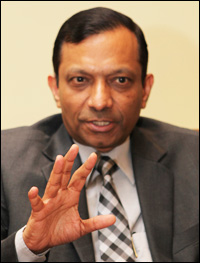Mahindra objects to Ssangyong audit
Mahindra & Mahindra, the Indian owner of Ssangyong Motor, said Monday that it objects to an audit by the National Assembly and that if it is pursued, it could affect the firm’s investment plan to the tune of 1 trillion won.
“Funds for this (1 trillion won) investment will have to be generated by a combination of fresh equity, internal accruals and external borrowing,” Pawan Goenka, president of Automotive & Farm Equipment Sector in the Indian conglomerate, said in an email interview. He also serves as the chairman of the board of directors at Ssangyong.
“These continuing allegations by an external union, supported by some civic organizations, is generating some sense of uncertainty and making it difficult to move forward,” Goenka said
Mahindra invested 522.5 billion won when it acquired Ssangyong two years ago; and it has approved an investment plan of more than 1 trillion won for the next four years.
The main opposition Democratic United Party and dismissed Ssangyong workers have been requesting the launch of a National Assembly inspection into the company, arguing that the firm’s massive lay-off in 2009 was “illegal” because the company manipulated its accounting to deflate its revenue in order to justify it.
“The request for a parliamentary probe is not justified,” Goenka said. “I think the demand for a parliamentary probe is in direct contradiction with rulings by the Financial Supervisory Services and court.”
He said a very detailed investigation by the FSS in 2012 confirmed that the allegations made by an outside union were unfounded and the Seoul Southern District Court also returned the same verdict.
The labor dispute at the automaker began because the firm restructured its workforce in 2009 by getting rid of about 2,600 workers after it was put into court receivership in the wake of the 2008 global financial crisis.
Of them, some 1,900 employees left the company under the name of “volunteer retirement” and 159 were dismissed, while 455 chose to take leave of absence without pay under the condition that they would be reinstated when the firm gets back on track.
Unionized workers have long denounced the massive layoff, arguing it was a “different name for murder,” because in the rigid labor market of Korea, it is difficult for older manual laborers to find new factory jobs. It triggered the fiercest labor strife since the 1980s, which lasted for 77 days.
Goenak also refuted the allegations that the firm has decided to reinstate all the workers on unpaid leave as a measure to avoid the parliamentary probe, adding it was a decision based on expected growing demand.
“In the last three years, through a combination of successful launches of facelifts and expansion to new overseas markets, Ssangyong has improved its sales volume considerably. Especially, there is a growing demand for the Line 3 products. The company has aggressive sales targets this year and hence there is a need to increase capacity on Line 3,” he said.
On Jan. 10, the nation’s smallest automaker announced that the management and labor union reached an agreement to reinstate 455 workers on unpaid leave. Under the agreement, they will return to work on March 1, while the retired and dismissed workers are not subject to the reinstatement plan.
In 2012, the firm’s sales climbed 6.8 percent year-on-year to 120,717 vehicles, and expects the number can jump to 150,000 this year.
Goenka also emphasized that all the groundless allegations surrounding Ssanyong only damage the image and credibility of the firm and make it difficult for it to focus on turnaround activities. He suggested management should be left alone to deal with its internal issues along with the union.
“The overseas distributors are very concerned about this situation. They still have the memory of what happened four years ago and are worried about the same situation in the future, in view of all these allegations. They need to gain confidence and start making investments to build the Ssangyong brand and increase sales volume which is critical for a turnaround of the company,” he said.
He also requested full support from the public and politicians for the automaker’s rebound.
“Mahindra and Ssangyong understand the need to make investments for future growth. At the same time, one should understand that the investments have to make business sense and not be forced by external pressure and there should be a conducive climate for it to happen,” he said. <The Korea Times/Kim Tae-jong>


























































